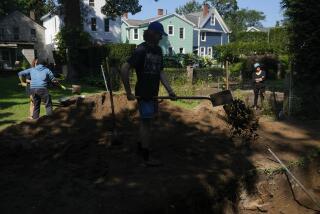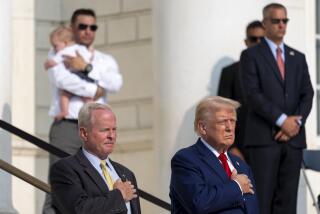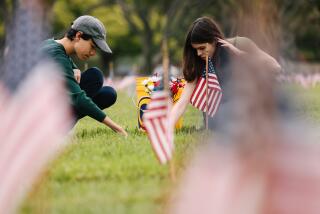Officials Fail to Quell Anger at Conditions in Cemetery
Inside the tabernacle of Faithful Central Baptist Church, the questions hang from the walls and the pillars; written in neat script, they quietly speak the thoughts of those who have gathered.
Where is my baby? Where is my father? Why the silence?
The nearly 200 people who gathered Saturday at the Inglewood church were seeking answers about the remains of relatives buried at the troubled Woodlawn Cemetery in Compton.
But after they listened to representatives of the district attorney’s office, the state attorney general’s office and the Cemetery and Funeral Bureau, the questions were still there--and the pain and the anger.
“I don’t see too much they’re doing,” said Deborah Covington, whose father and two brothers are buried in the cemetery. “We heard this before.”
In March, Woodlawn was ordered shut down after a state inspector found pieces of bones and fragments of caskets scattered around the grounds. Investigators also found that the cemetery had unlawfully converted single-burial graves to multiple graves.
Last week state officials announced that the cemetery will reopen Thursday, five days a week for visitations only. The bones and fragments of caskets have been cleaned up, officials said.
But relatives say they still have no idea if the graves they will visit--bringing flowers and whispering sentiments--actually contain the remains of their loved ones.
For some, not knowing where the remains are is like losing a relative again.
“Even though they’re talking about a cleanup, still, where are the bodies?” asked Cynthia Pitts of Paramount, who attended the meeting with her husband, mother and sister. “Is my brother still there? Whose bones are they? It’s painful. June 6 was his birthday. We couldn’t even get in to place flowers.”
Others worried about what will greet them when the cemetery reopens. From the locked gates they have seen gophers, holes throughout the cemetery, and grass untended.
G.V. Ayers, chief of the Cemetery and Funeral Bureau, said the cemetery had to be closed because of the investigation. Watering the grass might have ruined evidence.
“It was not a beautiful cemetery to start with,” Ayers told the audience. “The cemetery obviously has not gotten any prettier.”
But Ayers said the dirt disturbed around graves should not be taken as an indication that the graves themselves have been disturbed. In many cases investigators were sifting, searching for bones and fragments.
Many others expressed concern about the pace of the investigation. “We’re not trying to tell you how to conduct your investigation,” said Felicia Ford, who has several relatives at Woodlawn.
“We’re here today to tell you it is taking too long. We are here to demand answers. We also want to know who is responsible. . . . You go after deadbeat dads. And welfare moms, and here you have the worst, unimaginable crime and I don’t see [the owners] in handcuffs.”
Ford said she decided to organize the meeting after elected officials failed to do so, as a means of keeping distraught relatives informed.
“I have never seen so much suffering inflicted on so many people,” said Ford.
Many questioned the lack of oversight of Woodlawn by the state. At least two other cemeteries found in recent years to have problems were also located in primarily African American or Latino communities.
Deputy Dist. Atty. Ralph Plummer said the Woodlawn case was still being investigated by the Department of Consumer Affairs.
“If there’s a crime, we’re going to prosecute,” he said. “Look, this is the United States. When charges are filed, people are arrested.”
His words were insult added to injury for Darryl Pitts, whose wife sat in the audience in tears as she listened. In his mind, the one thing that is not in question is that something immoral and illegal happened at Woodlawn.
“He said, ‘if,’ ‘if,’ ‘if,’ ” said Pitts, who is not related to Cynthia Pitts. He questioned Plummer’s characterization of the events. “He’s sugar-coating it. At this point, we know there’s been a crime. Why would there be bones on top of dirt?”
More to Read
Sign up for Essential California
The most important California stories and recommendations in your inbox every morning.
You may occasionally receive promotional content from the Los Angeles Times.










